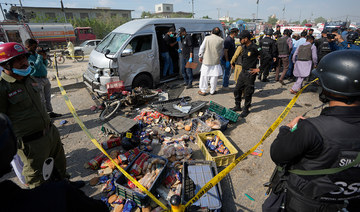ISLAMABAD: After a deadly clash between troops and activists at a security post in northern Pakistan, organizers of a rights movement that has unnerved the powerful army say a campaign of intimidation against them has intensified, with many top leaders detained.
The military denies a crackdown against the Pashtun Tahaffuz Movement (PTM), which campaigns against alleged extrajudicial killings and enforced disappearances of Pashtuns and other ethnic minorities, but says it is acting against lawbreakers.
Manzoor Pashteen, the PTM’s charismatic figurehead, said he has seen his closest aides detained. Two lawmakers who are part of the group’s leadership have also been arrested.
“In the past, they wanted to stop protests. Now they want to stop the movement,” Pashteen, who says he is the only member of the group’s core leadership not in custody, told Reuters. “They have directly arrested the leadership and begun a campaign to malign them (on social media).”
The PTM’s appeal among Pakistan’s more than 35 million Pashtuns - and its unusually direct criticism of the powerful military over alleged human rights violations - has brought it into conflict with the authorities, who allege it is being bankrolled by hostile neighboring countries.
The group has been barred from parts of the country and security forces have regularly tried to stop its rallies by arresting workers.
Some analysts and senior PTM members believe the latest arrests targeting leaders and aides were an attempt to isolate Pashteen within the group and provoke more hardline elements into a violent response that could then be used as a pretext to move against it.
The military press wing said there was no campaign against the PTM and that security forces had acted within the law.
“A few individuals are trying to incite Pashtun youth in a post-conflict environment, exploiting the ethnic/linguistic angle,” the military’s spokesman, Lieutenant General Asif Ghafoor, told Reuters in a statement.
“Whereas the state is responsible to address their genuine post-conflict care, no-one will be allowed to challenge the writ of the state ... a few individuals have been arrested for taking the law into their hands and they are facing legal procedures.”
FRESH ARRESTS
Many ethnic Pashtuns hail originally from the borderlands with Afghanistan, the focal point of a near-decade-long insurgency by militants.
PTM leaders complain that violence in their traditional homeland has led to Pashtuns throughout Pakistan being unfairly targeted and suffering abuses at the hands of security forces in the name of fighting terrorism.
The latest flashpoint came last month in North Waziristan, a majority Pashtun region on the Afghan border where the Pakistani Taliban controlled swathes of territory until they were pushed out by military operations in 2009 and 2014.
ADVERTISEMENT
On May 26, a group of protesters led by PTM leaders and serving parliamentarians Mohsin Dawar and Ali Wazir was fired upon by soldiers at a security check post, according to PTM representatives.
Kifayat Azad, a close aide of Dawar and Wazir, told Reuters that 13 civilians were killed in the incident. At least 25 PTM members were arrested in the following days, he said, of whom 10 have since been released on bail.
In its account of the incident, the army said the protest was aimed at exerting pressure for the release of a “suspected terrorists’ facilitator arrested the other day”. Troops exchanged fire with the protesters when they attacked the check post, it said, adding that three of the attackers were killed.
Rights groups in Pakistan have called for an investigation into the incident.
The PTM emerged last year after the killing of an ethnic Pashtun man by police in the southern city of Karachi, which led to a series of nationwide protests and turned the issue of alleged state violence against Pashtuns into a national debate.
Journalists at local television channels and newspapers have since said they face a complete ban on covering PTM protests and statements made by the groups leaders. The military has in the past denied that it muzzles Pakistan’s media.
TURNING POINT
In a strongly worded speech in April, the military’s spokesman warned PTM “their time is up” and said the group had received funding from Afghan and Indian intelligence agencies. PTM has denied taking foreign funding.
Analysts say the speech set the stage for the current spate of arrests.
“(General Ghafoor’s) warning that the PTM’s ‘time is up’ a few weeks ago seems to mark an official turning point in the state’s strategy,” Nida Kirmani, professor of sociology at the Lahore University of Management Sciences, told Reuters.
“This crackdown will only increase their (Pashtuns’) sense of alienation.”
Days after the check post incident, Pashteen said he was in a car with his close aide Idrees Mehsud when they noticed they were being followed.
As the car turned a corner onto another street, a number of men in plainclothes were waiting, alongside police officials.
Pashteen said the men told him they wanted to ask Mehsud a few questions. He was then taken away in a car and remains in custody.
The arrest followed the detention of Dawar and Wazir, whose election to Pakistan’s parliament last year affirmed PTM’s popularity amongst the country’s Pashtun electorate.
Both men have spoken out against military operations in the former tribal areas bordering Afghanistan since being elected, and have led large demonstrations across the country.
Pakistan Pashtun activists say leader arrests herald state crackdown
Pakistan Pashtun activists say leader arrests herald state crackdown
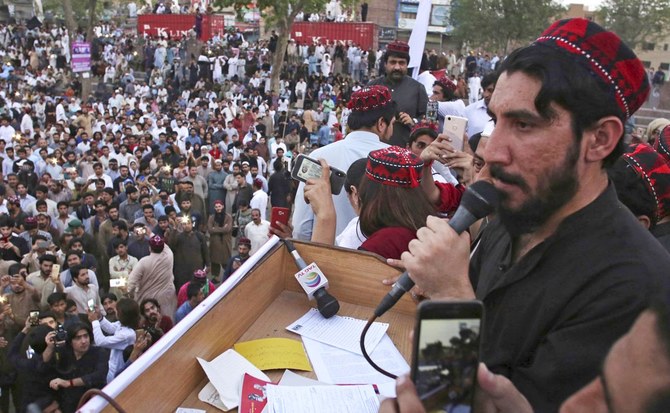
- The military denies a crackdown against the Pashtun Tahaffuz Movement (PTM), a vast civil rights movement
- PTM founder Manzoor Pashteen says he is the only member of the group’s core leadership not in custody
Pakistan send New Zealand in to bat in second T20I

- The clear weather is in contrast to Thursday’s first game which was cut short to five-over-a-side before being abandoned
- Pakistan kept the same eleven of the first game, having handed T20I caps to Usman Khan, Abrar Ahmed and Muhammad Irfan Khan
RAWALPINDI: Pakistan skipper Babar Azam won the toss and opted to bowl in the second Twenty20 international against New Zealand in Rawalpindi on Saturday.
The clear weather is in contrast to Thursday’s first game which was cut short to five-over-a-side before being abandoned after just two balls in New Zealand’s batting due to intermittent rain.
Pakistan kept the same eleven of the first game, having handed T20I caps to batter Usman Khan, spinner Abrar Ahmed and allrounder Muhammad Irfan Khan on Thursday.
New Zealand, missing nine players due to the Indian Premier League, brought in Cole McConchie in place of unwell Josh Clarkson.
The remaining matches are in Rawalpindi on April 21 and in Lahore on April 25 and 27.
Teams
Pakistan: Babar Azam (captain), Usman Khan, Abrar Ahmed, Iftikhar Ahmed, Mohammad Rizwan, Mohammad Amir, Muhammad Irfan Khan, Naseem Shah, Saim Ayub, Shadab Khan, Shaheen Shah Afridi
New Zealand: Michael Bracewell (captain), Mark Chapman, Cole McConchie, Jacob Duffy, Dean Foxcroft, Ben Lister, Jimmy Neesham, Tim Robinson, Ben Sears, Tim Seifert, Ish Sodhi
Pakistani province issues flood alert and warns of heavy loss of life due to glacial melting
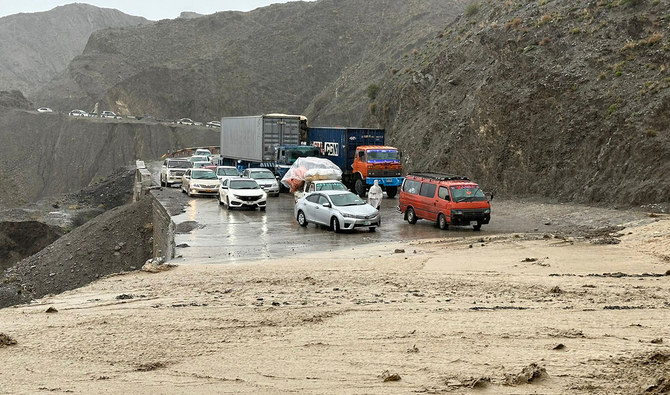
- The country has witnessed days of extreme weather, killing scores of people, destroying property
- Experts say Pakistan is experiencing heavier rains than normal in April because of climate change
PESHAWAR: A Pakistani province has issued a flood alert due to glacial melting and warned of heavy loss of life, officials said Saturday.
The country has witnessed days of extreme weather, killing scores of people and destroying property and farmland. Experts say Pakistan is experiencing heavier rains than normal in April because of climate change.
In the mountainous northwest province of Khyber Pakhtunkhwa, which has been hit particularly hard by the deluges, authorities issued a flood alert because of the melting of glaciers in several districts.
They said the flood could worsen and that people should move to safer locations ahead of any danger.
“If timely safety measures are not taken, there is a possibility of heavy loss of life and property due to the expected flood situation,” said Muhammad Qaiser Khan, from the local disaster management authority.
Latest figures from the province said that 46 people, including 25 children, have died in the past five days due to rain-related incidents.
At least 2,875 houses and 26 schools have either collapsed or been damaged.
The southwest province of Baluchistan has also been battered by rainfall. It said it had limited resources to deal with the current situation but if the rains continued, it would look to the central government for help.
In 2022, downpours swelled rivers and at one point inundated one-third of Pakistan, killing 1,739 people. The floods also caused $30 billion in damage.
Pakistan’s monsoon season starts in June.
Punjab seeks suspension of cellular services during Sunday’s by-polls in 13 cities
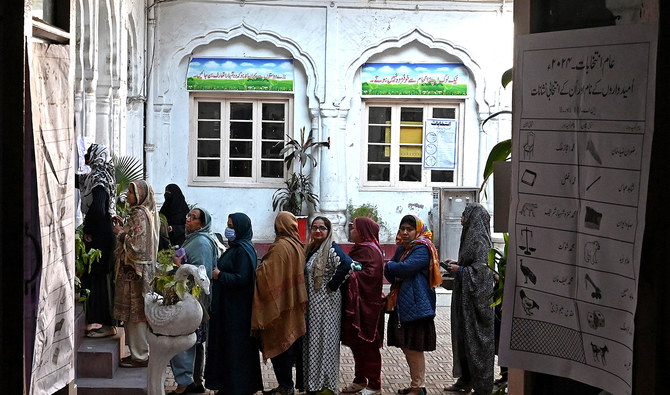
- By-elections will be held on 21 national, provincial seats in Punjab, Khyber Pakhtunkhwa and Balochistan provinces
- Pakistan’s national polls in Feb. were marred by mobile service shutdown, result delays, leading to rigging allegations
ISLAMABAD: The provincial government in Pakistan’s eastern Punjab province has requested for the suspension of mobile phone services in 13 cities during the by-elections on Sunday, according to the Punjab home department.
By-elections on 21 national and provincial seats in Punjab, Khyber Pakhtunkhwa (KP) and Balochistan provinces are scheduled to be held on April 21. Electioneering in these constituencies came to an end at midnight on Friday, according to a deadline set by the Election Commission of Pakistan (ECP).
In a letter to the interior ministry, the Punjab government requested suspension of mobile phone services in Talagang, Chakwal, Kallar Kahar, Gujrat, Ali Pur Chatha, Zafarwal, Bhakkar, Kasur, Sheikhupura, Lahore, Sadiqabad, Kot Chutta and Dera Ghazi Khan.
“I have been directed to request that mobile Internet services may kindly be suspended on 21st April, 2024 for maintaining law and order situation and to avoid any untoward incident [in the aforementioned areas],” a section office of the Punjab home department wrote in his letter to the interior ministry.
The seats, which are up for grabs in Sunday’s by-polls, were left vacant due to postponement of polls or were vacated by lawmakers, who won multiple seats, in national election in February.
The request by the Punjab home department comes amid expectations of a fierce competition between candidates backed by jailed former prime minister Imran Khan’s Pakistan Tehreek-e-Insaf (PTI) party and rival political groups.
Pakistan’s national election on Feb. 8 was marred by a mobile service shutdown and unusually delayed results, leading to accusations that the vote was rigged and drawing concern from rights groups and foreign governments.
Several political parties, including Khan’s PTI, and candidates had held protests and challenged many of the results before the ECP. However, the outgoing caretaker government and the ECP had denied allegations of any systematic rigging of the vote.
Police say attack on Japanese nationals in Karachi can be case of ‘mistaken identity’
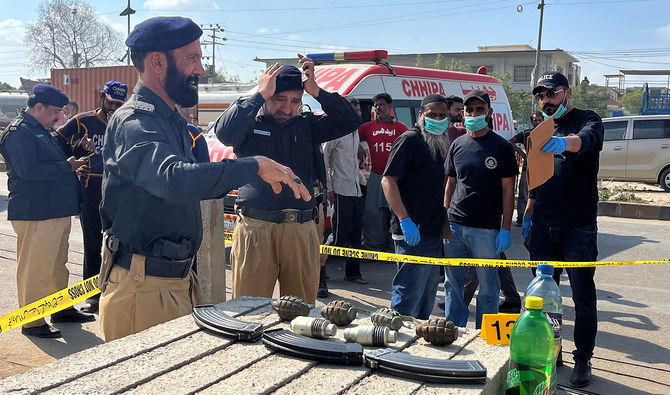
- In the past, Baloch separatists have claimed responsibility for attacks on Chinese nationals in the Pakistani port city
- However, Friday’s suicide attack on a van was the first incident in Pakistan that appeared to target Japanese nationals
KARACHI: The suicide attack on Japanese nationals in Pakistan’s southern city of Karachi could be a case of “mistaken identity” as no group has claimed responsibility for it, a senior police officer said on Saturday.
The Japanese nationals were traveling on Friday in a Hiace van to an industrial area, where they worked at Pak Suzuki Motors, when the suicide bomber detonated his explosive-laden vest near the van, according to police.
A police team escorting the vehicle returned fire after coming under attack, killing an accomplice of the suicide bomber. Officials said one of the attackers was identified as Sohail Ahmed, a resident of Panjgur district in the southwestern Balochistan province.
However, Ghulam Nabi Memon, the provincial police chief, said no militant group had accepted responsibility for the attack and it seemed they didn’t intend to attack the Japanese.
“For now, it seems to us to be a case of mistaken identity,” Memon told Arab News. “We are reviewing security protocols. The police and intelligence agencies are making efforts [to arrest the perpetrators].”
In the past, Baloch separatists have claimed responsibility for attacks on Chinese nationals in the Pakistani port city. However, this is the first time that the Japanese have come under such an attack.
A police officer, who spoke on the condition of anonymity, told Arab News that police suspected the attack was carried out by the outlawed Balochistan Liberation Army (BLA). The group has claimed several attacks, including the ones on the Chinese consulate in Karachi, Karachi Stock Exchange, and a suicide attack on Chinese teachers at Karachi University.
A BLA spokesperson didn’t respond to Arab News request for a comment on the attack.
Hours after the attack, Baloch activists shared videos on X, claiming raids were conducted on the homes of their supporters in Karachi.
A police officer, who requested anonymity, confirmed that raids were made to arrest the perpetrators and facilitators of the incident, but declined to share if any arrests were made.
“All I can share is that we are going in the right direction and an important breakthrough will be made soon,” he said.
On Friday, a police handout said the provincial police chief had chaired a high-level meeting, wherein he emphasized the need to establish a dedicated unit for the protection of Chinese nationals.
The police chief also stressed strict implementation of the standard operation procedures (SOPs) regarding the security of foreign delegates and regular issuance of security adviseries by authorities.
“Further discussions centered on enhancing security measures for all Chinese residents, experts, staff, and other foreign guests/delegates in Sindh,” the handout read.
In recent weeks, militants have targeted Chinese nationals working in Pakistan on projects relating to the China-Pakistan Economic Corridor (CPEC), a major segment of Beijing’s Belt and Road infrastructure initiative, which will connect China to the Arabian Sea and help Islamabad expand and modernize its economy through a network of roads, railways, pipelines and ports in Pakistan.
In March, five Chinese nationals and their Pakistani driver were killed in northwest Pakistan, when a suicide bomber rammed his explosive-laden car into the bus carrying them to Dasu Dam, the biggest hydropower project in Pakistan, where they worked.
Saudi cadet bags gold medal as fresh batch graduates from Pakistan Military Academy
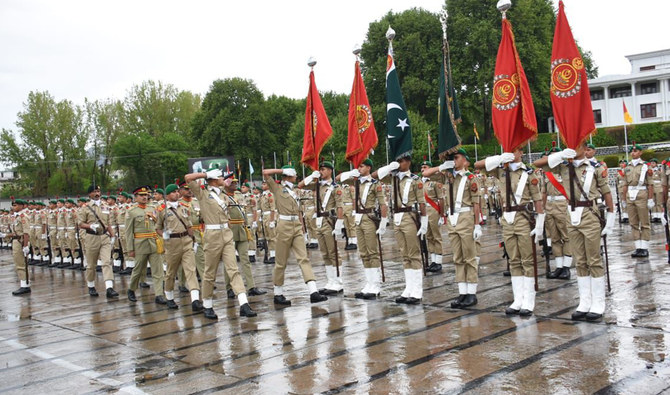
- Forty-nine cadets from “friendly countries” graduate from Pakistan Military Academy in Kakul, says army
- The PMA provides initial training to Pakistani cadets and recruits from friendly countries such as Saudi Arabia
ISLAMABAD: The Pakistan Army awarded the Chairman Joint Chiefs of Staff Committee Overseas Gold Medal to a Saudi cadet in recognition of his performance, as a fresh batch of local and international cadets graduated from the Pakistan Military Academy (PMA) on Saturday, the army’s media wing said.
General Sahir Shamshad Mirza, chairman joint chiefs of staff committee, was the chief guest at the passing out parade of the 149th PMA Long Course at the academy in Kakul. General Metin Gürak, the chief of the Turkish general staff who is on an official visit to Pakistan, was the guest of honor at the ceremony.
Gen. Mirza reviewed and spoke to cadets at the parade while General Gürak presented the awards to the distinguished cadets, the Inter-Services Public Relations (ISPR) said.
“The Chairman Joint Chiefs of Staff Committee Overseas Gold Medal was awarded to Friendly Country Senior Under Officer Fahad Bin Aqil Al Towarqi Al Fallaj from Kingdom of Saudi Arabia,” the ISPR said.
The army’s media wing said 49 cadets from “friendly countries” also graduated at the ceremony. The coveted Sword of Honour was awarded to Academy Senior Under Officer Muhammad Nauman Abdullah.
The President’s Gold medal was awarded to Company Senior Under Officer Muhammad Abdullah Javed of the 149th PMA Long Course, the army’s media wing said.
“Since its inception, PMA has remained the cradle of leadership and center of excellence for cadets joining the premier institution of Army,” Gen. Mirza was quoted as saying by the ISPR.
“Over the years, PMA has also trained scores of foreign cadets whose brilliant performance in their respective Armies stands testament to the professional ethos of PMA.”
The PMA in Kakul, Abbottabad, provides initial training to Pakistan Army cadets and recruits from friendly countries, including Saudi Arabia, the Middle East and elsewhere in the world.
Pakistan and Saudi Arabia enjoy fraternal relations, leading the two countries to cooperate in trade, defense and other vital sectors.
The Kingdom is home to over 2.7 million Pakistani expatriates and serves as the cash-strapped South Asian country’s largest source of remittances.



